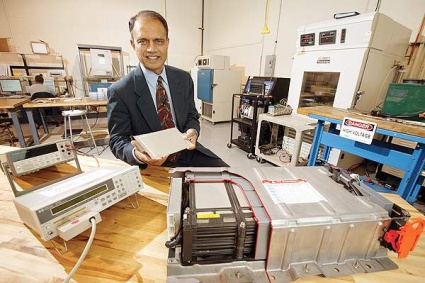
Prabhakar Patil was in charge of Ford's hybrid vehicle operations from 1998 to 2003 and is now CEO of a start-up called Compact Power Inc. Compact Power is developing lithium-ion batteries for hybrid vehicles and is a division of Korean company LG Chem. As anyone with a laptop from Dell, Apple or several other companies discovered earlier this year, lithium ion batteries have a nasty tendency toward thermal events (that is, they tend to explode in flames) if they're not manufactured correctly. The chemistry of these batteries is very complex and can generate a lot of heat as you might find during long calls on cell phone.
On the other hand, lithium-ion batteries are a huge advance over the lead-acid and other battery types used on the electric vehicles of the '90s. They have much better energy density and less of a memory effect. But they do have a limited number of charge cycles, generally on the order of 300-500 cycles. If you have any devices with lithium batteries like laptops, phones, iPods etc, you know that after a couple of years, the batteries are pretty worthless and won't hold a charge. In order, to make the batteries last the lifespan of a car, engineers use complex control software that manages the charging and discharge of the cells in the battery to maximize the lifespan. Tesla, for example, has sized their battery pack to be three times what is actually needed and then uses different segments of the battery over the lifespan of the car in order to make it last. Compact Power has a preliminary agreement to supply their batteries to an auto-maker for a 2010 program. Right now they are working on optimizing the chemistry and the control systems to maximize both the battery life and the safety in the automotive environment.
[Source: Automotive News - subscription required]


Sign in to post
Please sign in to leave a comment.
Continue